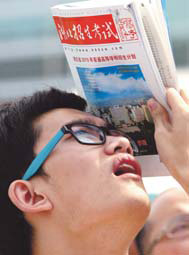Testing year ahead as key exam looms
Tan Nanqi is riding a roller coaster of emotions these days. Although solving a difficult mathematical puzzle may put her on cloud nine one minute, it is not long before the thought of next June brings her crashing down to earth.
The 17-year-old is among roughly 8 million students nationwide who this month embarked on their final grade in high school, a year of often intense pressure that culminates in the dreaded gaokao, or college entrance exams.
"Who isn't terrified of failing the gaokao?" said Tan, who studies in Nanning, capital of the Guangxi Zhuang autonomous region. "The outcome (of that test) will decide our destinies."
The three-day exam, which caps every Chinese student's 12-year education from elementary school to senior high, is vital for youngsters looking to secure a university place amid today's tough job market.
"Children endure a great deal of pressure during that last year," said Wang Xuming, a former spokesman with the Ministry of Education and now publisher of Language and Literature Press. "The gaokao is the only way for them to change their destiny, as society only acknowledges college qualifications."
Not just students feel the heat, though. Parents also suffer anxiety, with some even choosing to quit their jobs to provide 24-hour support to their children, seven days a week.
About 9.46 million students sat the gaokao last June, according to official figures. Although that number is expected to fall for the third consecutive year in summer 2011, competition for China's highly coveted college places remains fierce.
"The gaokao really counts," said Hu Chuan, a final-year student in Nanchang, capital of Jiangxi province, whose summer break this year was almost entirely taken up by extra study courses.
"I'm like an alarm clock now. I wake up at 6 am and can't fall asleep until after midnight," said the student, who has an average academic rating and admitted he has become virtually obsessed with catching the top performers in his class.
"Every time I take a rest, I think about the best students reading books, so I go back to studying. Every time I want to sleep, I think about them still doing exercises and I carry on studying," he added.
Unlike Tan and Hu, 17-year-old He Xing at Shanghai No 4 Middle School, insisted she is unfazed by the pressure.
"What doesn't require effort?" she mused coolly after being asked if she was daunted by preparing for the entrance exam. "I don't think I'll be staying up late, though. I'm a quick worker."
He's parents and grandparents were not so relaxed, however, and have already taken her on a tour of Peking University, as well as asked friends and relatives for recommendations on potential majors.
Whenever the teenager watches television during a study break, she said she is constantly prodded to return to her desk to study.
"My grandfather is always telling stories of historic scholars every time we dine together," said He. "Since I told him I wanted to be a doctor, he just repeats stories about Hua Tuo, an esteemed Chinese physician during the Eastern Han Dynasty (AD 25-220)."
Fan Linfeng, an experienced 12th grade teacher at the High School attached to Capital Normal University in Beijing, said He's experiences are not uncommon as the gaokao is still hugely important to families that cannot afford to send their children abroad to study.
"I came to Beijing from Central China's Henan province through the gaokao, so I know how much it weighs on students and parents," she added.
 0
0 







